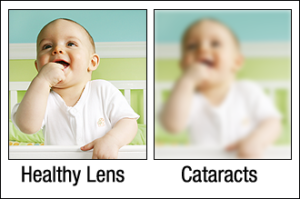Cataracts develop with age and are the leading cause of preventable blindness in the U.S. They form when proteins in the eyes break down and clump together in the lens.
As the clumping proteins gradually become more extensive, they start to distort and block your vision. But you don’t have to live with less than perfect vision when you have the option of surgery.
When an experienced cataract surgeon performs cataract surgery, it’s one of the world’s safest procedures and considerably improves your vision.
Most ophthalmologists will not recommend cataract surgery until cataracts begin interfering with your sight and making it impossible to perform daily tasks. Keep reading for 9 signs that you may need cataract surgery!
1. You’re No Longer Able to Enjoy Your Favorite Pastimes
Deteriorating vision can get in the way of enjoying your hobbies. It becomes difficult to see if you have cloudy or blurry vision because of cataracts.
Also, cataracts can reduce your ability to distinguish contrast, making it harder to enjoy everyday activities. This may include simple everyday things like cooking, doing laundry, and even watching television.
2. Performing Up Close Tasks Has Become Impossible

Cataract formation is a relatively slow process. Typically, most age-related cataracts develop over a span of years, and they only become a problem when they begin interfering with your everyday life.
If you are having a hard time with up-close tasks, it’s likely you have cataracts and require surgery. This might include activities like texting on your phone, sewing, and reading a book before you go to sleep at night.
3. Difficulty Driving at Night

To many people, driving means independence. But it can become dangerous with cataracts, and even more so when you’re driving at night.
Cataracts create halos around lights, making it hard to see when you’re driving in the evening. If you don’t feel confident while driving, see your eye doctor as soon as possible.
Driving at night with cataracts can endanger your life and others. For your safety and others on the road, have a friend or family member bring you where you need to go at night until you can have cataract surgery.
4. Everything Has a Brown Tint or Looks Yellow
When you have cataracts, it can appear as though you’re looking through a dirty window all the time. Colors may look muddy and faded instead of vibrant.
Another thing you might experience is things that you know are white may look yellow or even brown. This is due to the color of your cataract as it develops and grows bigger.
This can make it much more challenging to perceive fine details or distinguish colors. For most, the solution is cataract surgery to remove the natural lens and replace it with an artificial lens.
This will enable you to see more clearly and allow you to enjoy every beautiful, vivid color the world has to offer once more.
5. You Suddenly Start Having Double Vision
Although it sounds unusual, you may start experiencing something called double vision when you have cataracts. It’s essential to see your eye care professional at Evergreen Eye Center as soon as possible to determine what’s causing your double vision.
Most cataract patients report double vision in one eye. If you have double vision, it becomes almost impossible to complete any activity. Until you have cataract surgery, avoid activities like lifting, driving, or cooking.
6. Your Prescription Keeps Changing
As a result of aging, it’s normal for any prescriptions for your contact lenses or glasses to change over time. But if you find that these prescriptions keep changing more and more, this could be a sign of having cataracts.
One of the problems with having a cataract is that you will eventually get to a point where glasses and contacts will no longer improve your eyesight. When that happens, you’ll need cataract surgery to have your vision corrected.
7. Your Vision Gets Blurry

Having blurry vision makes moving around challenging. It also increases your likelihood of falling and injuring yourself and makes it much harder to keep your independence.
If your vision seems blurrier than usual, you need to see your eye doctor for an appointment right away. Though blurry vision can be a sign of cataracts, it’s also a sign of other more serious eye conditions.
Seeing your eye doctor is the only way to know the cause of your blurry vision, and if you do have cataracts, determine when you should have cataract surgery.
8. You Experience Light Sensitivity
Research shows that one of the early symptoms of cataracts is sensitivity to light, and it can be quite painful. If you experience light sensitivity, your eye doctor can use that to diagnose cataracts before you have more advanced vision changes.
Schedule an appointment if you find headlights glare from oncoming traffic or the sun bothersome.
9. You Start Seeing What’s Known as Second Sight
Some patients with cataracts may experience a phenomenon that’s known as second sight. Your vision temporarily improves with second sight, especially if you have nuclear cataracts that form in the center of your lens.
The sudden improvement in vision is short-lived and results in worsened vision later on. If you see more clearly suddenly after having poor eyesight because of cataracts, it might be time for surgery.
How to Protect Your Vision Against Cataracts

There is no way to guarantee that you’ll never develop cataracts, as they are simply part of life. But, there are some things you can do to try to reduce your chances of developing them earlier in life. You can try some of these lifestyle changes, including:
- Seeing your eye doctor for regular eye exams
- Eating a healthy diet that’s rich in vegetables and fruits
- Quitting smoking if you’re a smoker
- Limiting your consumption of alcohol as much as possible
- Wearing polarized sunglasses to prevent unnecessary exposure to the sun’s harmful UV rays
- Properly managing diabetes, which can cause cataracts
World-Class Cataract Treatment
It’s important not to ignore the warning signs of cataracts, even when your symptoms seem like only minor inconveniences. Cataracts progressively become worse with time, eventually resulting in complete blindness that only cataract surgery can correct.
Are you worried that it may be time to think about having cataract surgery? Schedule a cataract screening at Evergreen Eye Center in Tacoma, WA, now!

